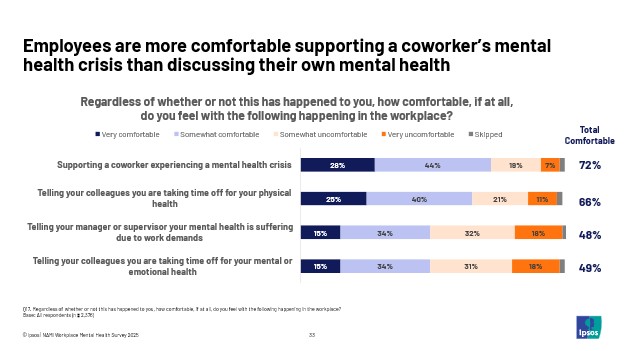Employees want more workplace mental health resources
Washington DC, February 25, 2025—The 2025 NAMI/Ipsos Workplace Mental Health Poll reveals full-time workers at companies with at least 100 employees believe discussing mental health at work is important, but they need more resources to feel comfortable doing so. Moreover, employees generally support colleagues' mental health concerns but are more hesitant to discuss their own, indicating persistent stigma. Two in five respondents worry their career would be negatively impacted if they talked about their mental health concerns in the workplace; women, caregivers, and LGBTQ+ employees are particularly vulnerable to burnout.
The poll also highlights a widespread lack of awareness about accessing employer-sponsored mental health benefits, especially among entry-level employees, though attitudes towards the importance of these benefits have remained stable since the previous year. Mental health trainings, while limited in availability, may have a positive impact on reducing stigma and improving productivity among those who receive them, with a strong majority of employees and managers recognizing their value in fostering a positive workplace culture.
Detailed Findings:
- A significant awareness gap exists around availability of workplace mental health benefits. Mental health training and education are limited in workplaces.
- A quarter of employees are unsure if their employer offers mental health benefits - unchanged from 2024 - with uncertainty rising to 1 in 3 among entry-employees.
- Only 21% of employees have received formal education on mental health issues from their employers, with slightly more (28%) trained on available resources, virtually unchanged from 2024.
- A strong majority believe it is appropriate to discuss mental health concerns at work, but fewer feel comfortable actually doing so.
- Three in four surveyed employees believe it's appropriate to discuss mental health concerns at work, and 72% feel comfortable supporting a coworker experiencing a mental health crisis.
- Yet fewer, 58%, say they feel comfortable sharing about their mental health at work.
- While 81% of managers feel prepared to support their reports' mental health, only 67% believe their company provides proper resources for this support, statistically unchanged from 2024.
- Employees express high demand for mental health education and resources. When implemented, mental health training can have a positive impact on workplace discussions. Moreover, nine in ten believe offering mental health care benefits positively impact workplace culture.
- The majority find all mental health training topics helpful, from stress management to identifying crisis situations.
- More than eight in ten employees recognize mental health and well-being training as important for a positive workplace culture, statistically unchanged from last year.
- When implemented, mental health training proves to be beneficial, with over half (57%) of employees feeling more comfortable discussing mental health afterward, statistically unchanged from 2024.
- Leadership benefits greatly, with 75% of managers reporting training around mental health makes them more comfortable talking about mental health or mental health resources with their team.
- Ninety-one percent of employees believe mental health care benefits are important in creating a positive workplace culture.
About the Study
This NAMI/Ipsos poll was conducted January 21-27, 2025, by Ipsos using the probability-based KnowledgePanel®. This poll is based on a nationally representative probability sample of 2,376 general population adults, age 18 or older, who are employed full-time and work at a business or company with at least 100 employees. This sample includes 104 executives. The 106 executives in the sample include an oversample of N=31 executives.
The margin of sampling error for this study is plus or minus 2.3 percentage points at the 95% confidence level, for results based on the entire sample of adults. The margin of sampling error takes into account the design effect, which was 1.3. The margin of sampling error for executives is plus or minus 10.7 percentage points at the 95% confidence level. This margin of sampling error for executives takes into account the design effect, which was 1.24. The margin of sampling error is higher and varies for results based on other sub-samples. In our reporting of the findings, percentage points are rounded off to the nearest whole number. As a result, percentages in a given table column may total slightly higher or lower than 100%. In questions that permit multiple responses, columns may total substantially more than 100%, depending on the number of different responses offered by each respondent.
The survey was conducted using KnowledgePanel, the largest and most well-established online probability-based panel that is representative of the adult US population. Our recruitment process employs a scientifically developed addressed-based sampling methodology using the latest Delivery Sequence File of the USPS – a database with full coverage of all delivery points in the US. Households invited to join the panel are randomly selected from all available households in the U.S. Persons in the sampled households are invited to join and participate in the panel. Those selected who do not already have internet access are provided a tablet and internet connection at no cost to the panel member. Those who join the panel and who are selected to participate in a survey are sent a unique password-protected log-in used to complete surveys online. As a result of our recruitment and sampling methodologies, samples from KnowledgePanel cover all households regardless of their phone or internet status and findings can be reported with a margin of sampling error and projected to the general population.
The data for the total sample were weighted to adjust for gender by age, race/ethnicity, Census region, education, household income, and executive status. The demographic benchmarks came from the 2024 March Supplement of the Current Population Survey (CPS). The executive status benchmark was calculated using screening data from the total sample.
- Gender (Male , Female) by Age (18-29, 30-44, 45-59, 60+)
- Race-Ethnicity (White/Non-Hispanic, Black/Non-Hispanic, Other/Non-Hispanic, Hispanic, 2+ Races/Non-Hispanic)
- Census Region (Northeast, Midwest, South, West) by Metropolitan Status (Metro, Non-Metro)
- Education (Less than High School, High School, Some College, Bachelor or higher)
- Household Income (under $25K, $25K-$49,999, $50K-$74,999, $75K-$99,999, $100K-$149,999, $150K and over)
- Executives (Yes, No)
About Ipsos
Ipsos is the world’s third largest Insights and Analytics company, present in 90 markets and employing more than 18,000 people.
Our passionately curious research professionals, analysts and scientists have built unique multi-specialist capabilities that provide true understanding and powerful insights into the actions, opinions and motivations of citizens, consumers, patients, customers or employees. We serve more than 5000 clients across the world with 75 business solutions.
Founded in France in 1975, Ipsos is listed on the Euronext Paris since July 1st, 1999. The company is part of the SBF 120 and the Mid-60 index and is eligible for the Deferred Settlement Service (SRD).
ISIN code FR0000073298, Reuters ISOS.PA, Bloomberg IPS:FP www.ipsos.com



